Mountain honey contains a combination of microelements and nutrients taken from pollen and nectar of wild plants. Beekeepers appreciate this variety for a pleasant taste., and attribute it to the elite varieties.
Often, such honey is called based on the area where the nectar was going to come from (Caucasian, Crimean, Ural, Altai), or under the name of the main honey plant.
It is also called honey from raznotravya, because the bees work simultaneously with several honey plants. Indeed, in nature is rarely found a variety in its pure form. In mountain honey there is no clearly defined melliferous purity. Their number is more than three or five in one honey.
And also mountain honey is unique in its effects on the human body. Not only grass, but also wild trees and shrubs act as a melliferous plant.
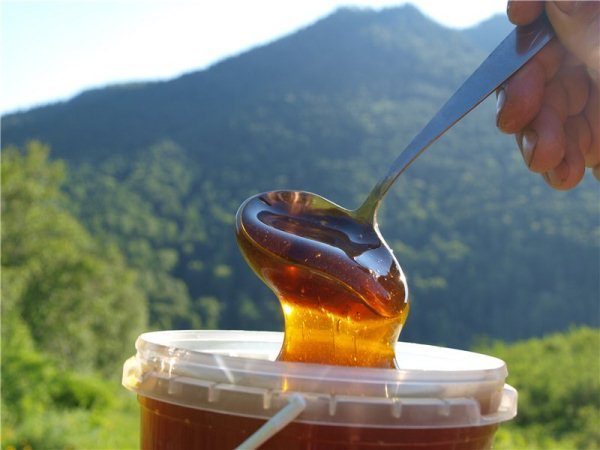
One of the rarest mountain honey varieties is wild. He is going wild bees. The main gathering place is the Ural Mountains.
Table of contents
Taste and color
Mountain honey is very fragrant, has a pleasant, rich taste a bit cloying. This is especially true for wild honey.
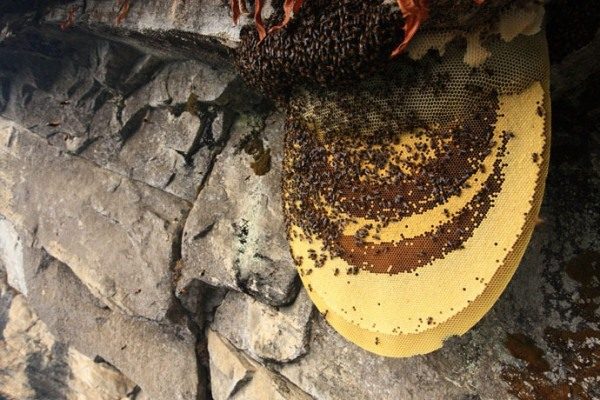
It has a yellow color, shades - from straw to brown. After saccharification brightens slightly, acquiring a fine-grained structure. Pleasant aftertaste.
In the solid state it is difficult to spread on bread, but it is well cut with a knife.
The composition of mountain honey: vitamins and minerals
Mountain honey is rich in easily digestible carbohydrates, in particular fructose:
| Composition | % |
|---|---|
| Squirrels | 0,5 |
| Fat | 0 |
| Carbohydrates | 72 |
| Fructose | 39 |
| Glucose | 36 |
| Water, polysaccharides, sucrose, ash, organic acids other substances | 25 |
Fatty acids are absent. The main trace elements and minerals: manganese, fluorine, chromium, calcium, iron, nickel, copper, zinc and others.
In its composition contains ascorbic acid (vitamin C), vitamins of group B, vitamin K and E, other. The composition of the taiga honey consists of apple, milk, lemon, wine and oxalic.
Honey is nourishing. But compared to other varieties loses. 100 g of the product contains about 290 calories. therefore people leading a sedentary lifestyle, and children are recommended to eat it.. For the prevention of this bee product is enough 80 g per day.
You may be interested in the composition and properties of other varieties of honey:
- Useful properties and contraindications taiga honey
- Useful properties and contraindications coriander honey
- Useful properties and contraindications dyagilovogo honey
- Useful properties and contraindications sweet clover honey
Beneficial features
The beneficial properties of mountain honey are not limited to soothing, anti-inflammatory and antiseptic. The composition of this variety successfully fights against harmful microbes, improve the body's immunity in any season. The high content of fructose contributes to the fact that it is used by people with diabetes in moderate quantities after consulting with your doctor.
Honey has a tonic and restorative effect on the bodyespecially after mental and physical exertion. This product has a beneficial effect on the nervous system, i.e. gives a calming effect. Therefore, it is useful to take it in the evening just before bedtime.
is he improves appetite. To activate the digestive processes, this variety is consumed in the morning on an empty stomach, with a glass of water. In folk medicine it is widely used for the treatment of wounds, for colds, for inhalation of the respiratory tract.
Contraindications and harm
Do not recommend mountain honey:
- To persons suffering from allergies to pollen or bee products;
- Children up to three years.
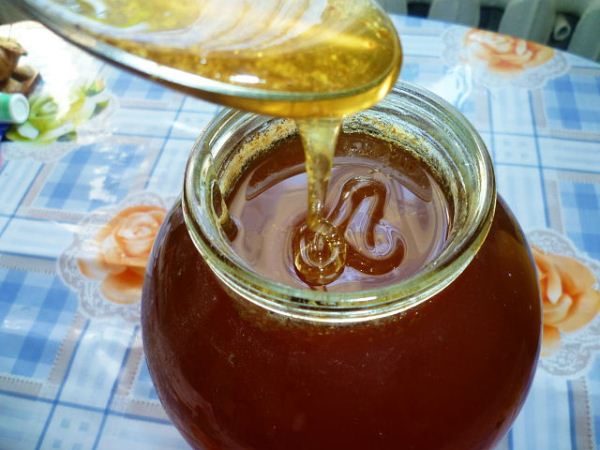
Recommend to take in small quantities (up to 30-40 g per day):
- Pregnant women;
- Insulin-dependent;
- Teenagers.
The rest with pleasure can regale the product, eating up to 100 g per day.Better to do it morning fasting or before bed in the evening.
About honey plant
Honey of mountain honey can be herbs:
- Melissa;
- Thyme;
- Hawthorn;
- Phacelia;
- Radiola;
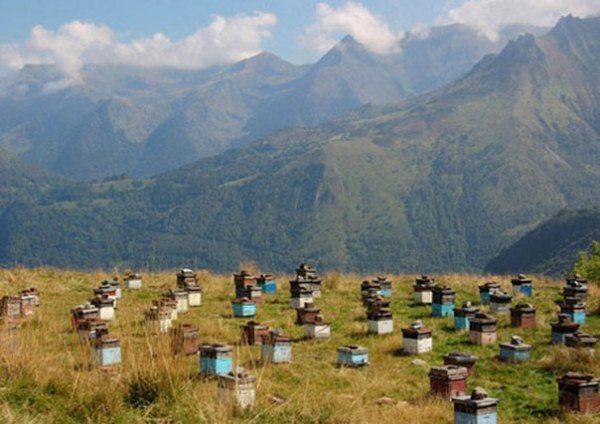
In addition, there are many wild trees and shrubs in the foothillswhich are excellent honey plants:
- Acacia;
- Blackthorn;
- Rosehip;
- Bird cherry
Plants bloom at different times all summer and early autumn. Medium bribery average, but, given that mountain honey is highly valued, the profitability of this variety is good.
Storage conditions
Mountain honey crystallizes quicklyTherefore, having bought it in a liquid state, in a few months you can use a knife to cut it. With this consistency recommended storage temperature from 5 to 7 degrees with a plus. Temperatures above 40 degrees Celsius and below 30 degrees Celsius adversely affect the beneficial properties of this product.
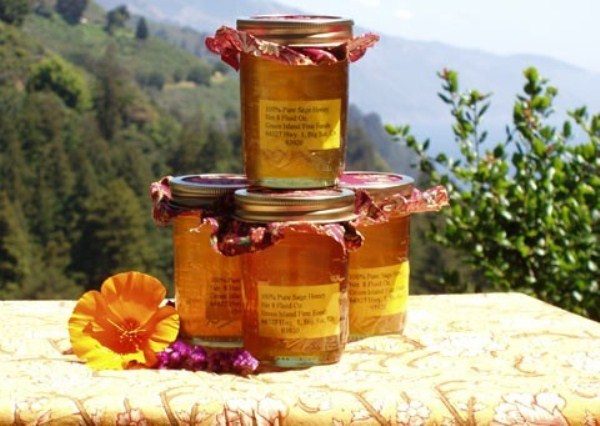
When the humidity is above 60% in the open This variety absorbs the moisture of the environment in itself, so there is a chance of souring, especially at elevated temperatures. Therefore, it is better to observe the specified mode.
What are the main diseases treats?
Mountain honey is recommended to use with cystitis.
It helps the body fight diseases, activating its capabilities, strengthening the immune system. This happens due to the release of large amounts of vitamins, minerals and other substances. The product is useful for gastritis, ulcers and other diseases of the gastrointestinal tract.
With its moderate use normalizes body metabolism, therefore, it is useful to eat with obesity or dystrophy.
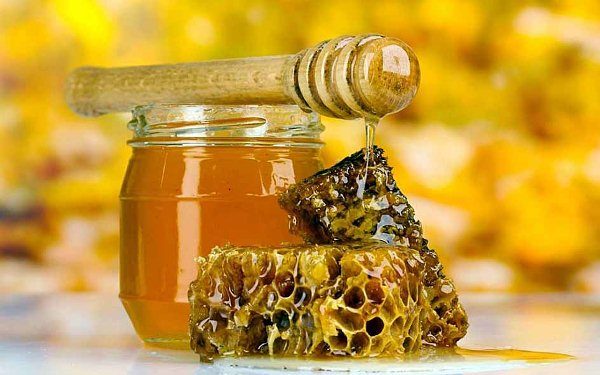
Honey helps to cure certain eye diseases.for example, conjunctivitis. Bee product copes with skin diseases. With regular use, you can forget about tachycardia. Like all varieties, this honey used for colds, bronchitis, other diseases of the respiratory tract, headaches.
This bee product helps with anemia, atherosclerosis, increased thyroid function, insomnia. is he removes toxins from the body.
The list of the above useful and healing properties of honey is not final. Mountain honey is one of the most sought after and expensive varieties.. It is used with pleasure and appreciated.

Doctors say that the rate of honey consumption by an adult should not exceed one teaspoon. Never tried mountain honey. Is it difficult to buy it?
Kira, depends on the region. Somewhere in Altai, I think it is not difficult.